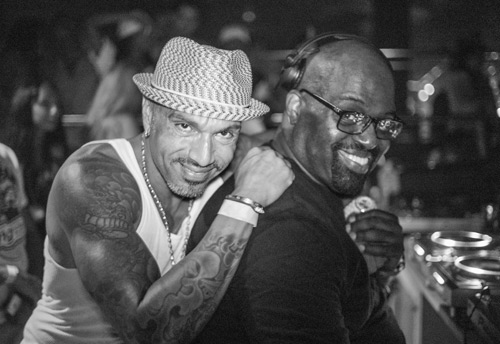Brooklyn legend David Morales plays Glitterbox Saturday 09 August, bringing with him an unsurpassable level of dancefloor experience. He also brings fellow New York native Hector Romero, a crucial part of Morales’ world famous ‘Def Mix’ family with his own weighty experience. Their stories align to a core strand of dance music history.
Morales’s DJ potential was first spotted by Paradise Garage hero Larry Levan, leading to regular appearances at New York’s (and dance music’s) iconic clubs Paradise Garage, The Loft and Sound Factory. Prior to that, in 1983 he’d landed himself in Judy Weinstein’s For The Record pool – a highly influential promo circle for the then who’s who of DJs, remixers and producers. Morales, a swaggering young Puerto Rican spinner, quickly grew in profile whilst catching the studio bug from the exclusively remixed records he was being sent. He acknowledged the power of re-editing and remixing established artists, keen to customise tracks himself so that he might bolster his own DJ sets. By now, Morales had started working for Weinstein as Pool Director but was spending less and less time in the office as he perfected his production craft. Weinstein sacked him but offered to manage him instead, suggesting they co-launch a production company which Morales would label Def Mix.
Morales’ further astronomical rise would match that of his and Weinstein’s fledgling company. Weinstein handled the Def Mix business, whilst Morales concentrated on the DJing and burgeoning remix work. His official studio debut came in 1985, remixing The Zummos’ ‘An Obsession (Over You)’. A raft of far higher-profile commissions followed – remixes for the likes of Neneh Cherry, Inner City, Chaka Khan and Yazz.
During the Nineties, Morales’s relentless, high quality focus on DJing and remixing earned him the status of being one of dance music’s first true superstars. Both his rolling tribal and lush, piano-house sounds became world renowned benchmarks for top-tier house production, as well as synonymous (particularly the latter) with the Def Mix name. Morales remixes of Ce Ce Peniston (‘Finally’, 1991), MAW feat. India (‘Can’t Get No Sleep’, 1995), Jamiroquai (‘Space Cowboy’, 1995) and Bjork (‘Hyper-Ballad’, 1995) were particular highlights, balancing credible groove with polished, commercial appeal. His work, too, for diva extraordinaire Mariah Carey (remixes of ‘Dreamlover’, ‘Can’t Take That Away’, ‘Fantasy’) rocked global dancefloors. Such was Morales’ reputation that Carey was happy to re-record her vocals especially for his remix of 1993’s ‘Dreamlover’ – a remix that she had specifically requested.
Morales’ first original production landed in 1993, an 11-track album ‘The Program’ (recorded as David Morales & The Bad Yard Club) which spawned monster dance hit ‘Gimme Luv (Eenie Meenie Miny Mo)’ – a Billboard dance chart topper for two weeks. But it wasn’t until The Face’s ‘Needin’ U’ in 1998 that Morales’ role as out-and-out producer truly exploded – the record, sampling The Chi-Lites’ ‘My First Mistake’ and Rare Pleasure’s ‘Let Me Down Easy’ whilst maintaining Morales’ classic, soulful piano-house vibe (and eventually spawning a vocal upgrade with singer Vernessa Mitchell), would become his biggest ever release. In the same year he was awarded a Grammy for ‘Remixer of the Year’.
That’s not to say Morales’ discography was in any way about to slow down. In 2000 he released ‘Higher’ with Albert Cabrera, as Moca. The single was another uplifting crossover smash. Four years later came the release of second artist album ‘2 Worlds Collide’ on Ministry Of Sound offshoot Data. Morales’ new long-player fused retro-house vibes (well before clubland’s current retro renaissance) with contemporary twists and turns and re-affirmed his position as electronic dance giant. Collaborations with vocalists Roisin Murphy, Polina and Jonathan Mendelsohn between 2011-12 are, officially, Morales’ last original discographic entries but, still, he continues to remix (everyone from Michael Jackson – Jacko’s most recent posthumous output – to Daft Punk) and, as Glitterbox attests, DJ.
Hector Romero joined Def Mix in 1994, recruited by Weinstein after his promising early forays on New York’s club scene. His earliest prowess, spicily mixing Latin, hip-hop and house at Bronx block parties aged just 13 earned him the nickname ‘Baby Hec’, and then residencies at Latin dance club La Mirage and slick street joint Devil’s Nest (where Louie Vega also started out). From there it was a relatively short schlep to cult Big Apple nights Save The Robots, The Red Zone (opening for Morales), the Palladium and the Roxy.

Romero loves to DJ and he has built incredible profile across the world doing so. There is no sign of a let-up, his most recent run of bookings taking him to Japan, China, Canada, the US, the Netherlands, Germany and New York. He is involved with several radio and internet music stations – again, all over the world – and, in recent years, has led the line for Def Mix Radio; a monthly iTunes podcast. Romero has previously described himself as a DJ with a musical identity crisis, which goes some way to explaining his penchant for diversity and soulful, rhythmic flow. It also suggests he’ll be a perfect fit and total standout at Glitterbox, where the onus is very much on feel-good house without boundaries of any description.
Of course, Def Mix as a collective pivots just as strongly on the reputations of Satoshi Tomiie and the late, great Frankie Knuckles. Knuckles was an early signee to the stable, having known Weinstein – perhaps unsurprisingly - for some time. Weinstein introduced Knuckles to Morales at downtown Big Apple club World where the latter was playing. The pair instantly hit it off and, in the blink of an eye, Knuckles was fully embraced by the Def Mix set-up. In turn, whilst on a DJ tour of Japan, Knuckles met a keen, young music student – Tomiie. A DJ and prodigious keyboard player, too, Tomiie sent Knuckles a demo upon his return to New York. One of the demo’s tracks was ‘Tears’ – this future house classic was Tomiie’s passport to joining Def Mix himself.

Stretching back over 25 years and embracing the discographies of all beneath its mighty banner, Def Mix represents a comprehensive history of dance music in itself. In the Nineties, when the brand was at its absolute peak, DJs around the world were scrabbling for the expensive import releases that included any kind of Def Mix edit or remix. At a time when remixes were first starting to out-shout their original source material, Def Mix ensured its own remix work stood out for all the right reasons – the collective were able to remix unlikely songs, providing both dancefloor oomph and a respectful measure of the original’s sound.
Beyond Morales’ countless hit records, as mentioned above, who could forget Knuckles’ virtuoso update of ‘Tears’ (1989) or epic remix of Sounds Of Blackness’ ‘The Pressure’ (1991); or Tomiie’s re-edits of Joi Cardwell and (alongside Knuckles) Toni Braxton? Where Tomiie wasn’t remixing he was providing swish keys (a Def Mix trademark) for the others, alongside fellow keyboardists Eric Kupper and Peter Daou. Def Mix’s insistence on high-end productions in top-drawer studios with world class musicians further cemented its now historical impact on the wider scene.
Knuckles won a Grammy the year before Morales did, in 1997. Def Mix was truly at the height of its powers towards the turn of the century. But if the remixes and productions haven’t arrived as consistently in the Noughties (and beyond) – in part, a reflection of the club scene’s shifting focus to harder, more minimal forms of 4-4 – and the death of Knuckles earlier this year is still sorely felt, then the collective’s DJing has continued apace, a healthy mix of soulful party spirit and sincere education (the Def Mix team also operating as house ambassadors to clubland’s younger, upcoming generation).
Def Mix’s family has also swelled to include Brazilian hotshot DJ Meme and, another New York innovator, Quentin Harris. Glitterbox will actually see Harris joining Morales and Romero next week. The talented DJ-producer, inspired by Def Mix as a kid, has evolved into a major house player himself over the past decade or so and is a key component in driving Def Mix forward beyond last year’s landmark 25th anniversary celebrations.
It’s impossible, really, to imagine the dance music world without Def Mix. Perish the thought....
For more info on David Morales and Hector Morales’ Ibiza appearance at Glitterbox 09 August, head to www.glitterboxibiza.com
Defected presents Glitterbox Ibiza 2014 is out 11 August (digital) on Defected Records -order from iTunes



